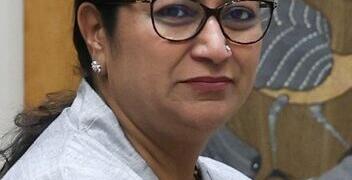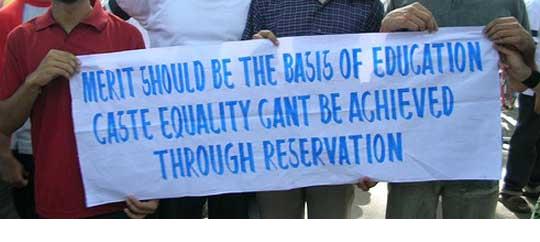 Sometime last week, the entire mainstream media had gone gaga over RSS supremo Mohan Bhagwat’s purported statement supporting doing away with reservation policy. We know today that it was one of Mainstream media’s usual fibs. However, the controversy it generated was powerful enough to force BJP into issuing an official statement announcing its support for the reservation policy as it exists today. Opponents piled on BJP with Laloo daring Modi to do away with reservation, NiKu declaring RSS was BJP’s supreme court and the Congress bore a smug smile and rubbed its hands in glee. Tragically, what could have become a starting point for a nationwide discussion on the Reservation policy, degenerated into inaudible cacophony. All political parties claimed credit in giving the weaker sections their due. As a result, today, we have no mainstream political party that supports a review of the reservation policy to make it more “equal” and relevant.
Sometime last week, the entire mainstream media had gone gaga over RSS supremo Mohan Bhagwat’s purported statement supporting doing away with reservation policy. We know today that it was one of Mainstream media’s usual fibs. However, the controversy it generated was powerful enough to force BJP into issuing an official statement announcing its support for the reservation policy as it exists today. Opponents piled on BJP with Laloo daring Modi to do away with reservation, NiKu declaring RSS was BJP’s supreme court and the Congress bore a smug smile and rubbed its hands in glee. Tragically, what could have become a starting point for a nationwide discussion on the Reservation policy, degenerated into inaudible cacophony. All political parties claimed credit in giving the weaker sections their due. As a result, today, we have no mainstream political party that supports a review of the reservation policy to make it more “equal” and relevant.
It is not that BJP’s clarification on the controversy comes as a surprise. In fact, it was done expeditiously keeping in mind the Bihar polls where janata has historically voted its caste. The only thing that was missing from the clarification was a small addendum. Something like “However, the government is open to exploring all options to make the reservation policy stronger by bringing all vulnerable sections of the society in its ambit, taking into confidence all political parties and various sections of the society”. Not to say, that the government cannot attempt to tweak the policy today, but the categorical refusal of the BJP in even considering the possibility of revision of the Reservation policy somewhat hurts a section of hardcore BJP supporters, who have tended to look at this policy with disdain. The Mandalization of Indian politics and the cartelization of vote banks means that any talk of revisiting Reservation policy might invite swift electoral retribution, and that is precisely what is scary about the policy- it is monolithic and unchangeable.
The makers of the constitution had not and did not want an unending policy of state patronage for the weaker sections. In fact, before the much maligned Mandal reforms, the constitution provided affirmative action for the so called Scheduled castes and tribes, upto 22.5%, subject to periodic review. The Mandal commission, set up by the Janata Party government, recommended the addition of the so called Other Backward Castes, adding another 27% reservation, thereby bringing the total reservation percentage to 49.5%. This report was implemented by VP Singh in 1990. The Supreme Court has ruled that reservations cannot exceed 50%, though in states such as Tamil Nadu, 69% of the seats stand reserved. The emergence of Mandal politics and establishment of strong vote banks by Laloo, Mulayam, Mayawati et al has meant that the extension of the reservation policy now happens pretty much automatically. Sadly, it is the one point that unites all our political parties.
There had been strong protests when the Mandal commission reports had been accepted. Massive student protests, dharnas, bandhs and cases of self immolation were reported from far and wide. Indian economy then, unlike now, had limited employment opportunities and that too mostly in the public sector, which the protesters, rightly felt were being denied to them. In spite of the scale of protests, none of the mainstream political parties extended their support to the protesters. The protests, on the other hand, galvanized the backward communities, who banded together under the likes of Laloo, Mulayam and Paswan and began to make their political presence felt. There was an anti-reservation redux in 2006, when the UPA government extended reservation to higher educational institutes. Movements such as Youth for Equality, emerged and ultimately fizzled out with the lack of political support. Interestingly, the 2006 constitutional amendment was passed with almost 100% support (2 members abstained) in the Lok Sabha.
The need for reviewing reservation policy stems from two grounds-
1. In today’s times, it is economic status rather than caste, which is primary determinant of need for state patronage
2. Reservation policy is opposed to the concept of meritocracy
In this light, BJP’s categorical refusal to initiate a debate on the reservation policy is a big let down. However, soon after this controversy, Rajasthan government passed 2 bills, one of which, reserved seats for the economically backward communities. It is unlikely that the law will ultimately prevail as it takes the percentage of reserved seats in Rajasthan to 68%. However, it is good to see some steps for extending benefits to the economically deprived irrespective of their castes. One of the drawbacks of the curent reservation policy is that it has consolidated castes instead of dissolving them. Hence the demand for reservation by Gurjars, Patels and other communities.
In the short term, it seems unlikely that the present reservation policy would go away. In this situation, the way forward is to continue the growth and consolidation of private sector, where these rules don’t apply, and eventually render the reservation policy meaningless. The other solution could be in the form of intervention by the Supreme Court that does away with this policy
In a country like ours, where political will seldom matches public expectations, that seems the only way.




























“However, the government is open to exploring all options to make the reservation policy stronger by bringing all vulnerable sections of the society in its ambit, taking into confidence all political parties and various sections of the society” I think BJP knows very well that how mass media twists its words like it did with Mohan Bhagwat. Please read article from newslaundry http://www.newslaundry.com/2015/09/23/much-ado-about-bhagwat-did-he-really-say-what-youve-read-in-the-mainstream-media/. It could have been “misinterpreted” by mass media that BJP is following RSS ideology or it supports abolition of reservation. It is media not politicians who are doing Mandalization of Bihar. Too bad there is no option of review whether reservation actually improved the lives of intended people. Reservation is here to stay untill mindset of people change.
I was reading articles on meat bans where they claimed that only 2% brahmin indians are vegetarian, hence not represent a majority, hence there should be none. And while talking about reservation the argument is they are upper caste and they “oppress” 50% lower castes (according to Mandal stats). I feel this is just hippocracy. Just because they are 2% you don’t think they are worth giving reservation (not important for vote bank). But Yadavs who are 14% of population deserve reservation as they are important vote bank. .What about those castes who are getting reservation for last 60 years? Should they be still considered backward?
There is no actual analysis whether the lower representation of OBC/Dalits are due to discrimination or poor educational system. If it is due to discrimination, then also reservation can’t help. People responsible for discrimination should be punishable by law. Remember how a MBA grad was denied job for being Muslim. The company took appropriate action against the one who was culprit and gave the job to this grad not because of reservation but because of his educational qualities.
Dear TFI,
I would like to point your attention to a recent case where a person was allegedly killed for the alleged rumour that he kept beef in his house. Though the investigation has not started yet and of course its condemnable, UP government was quick enough to announce Rs 10 Lakh compensation to victim’s family. Usually compensation is given in scenarios where there is natural disaster or government’s fault. I fail to understand the need to compensate a family for a local crime. If same yard stick to be used then UP government should compensate to faimiles of all victims who are raped or murdered. They don’t compensate to people dying in road accident due to potholes in road, which is actually government’s mistake and there is also judgement from Supreme Court regarding that. Is it to woo particular community? Will government would have done same if the victim was from Brahmin family? Would he got same media attention?. In terms of economy of UP per population is lies in last 5 including Bihar. Still government is busy to tax free the big money making movies like PK, Manjhi and Bajrangi Bhaijan.
I think TFI should do a survey about it.
Thank you and Regards
Common Indian Citizen
Indian people need to be educated about benefits of Gaumutra then only we will be a emerging nation. It has many benifits to make india a develop country. Its shame that many indians consider Gaumutra unhealthy an unhygenic.
https://m.youtube.com/watch?v=a-Be8qOl0fI
STOP paying TAXES and boycott EXAM . if govt . respect your merit marks.